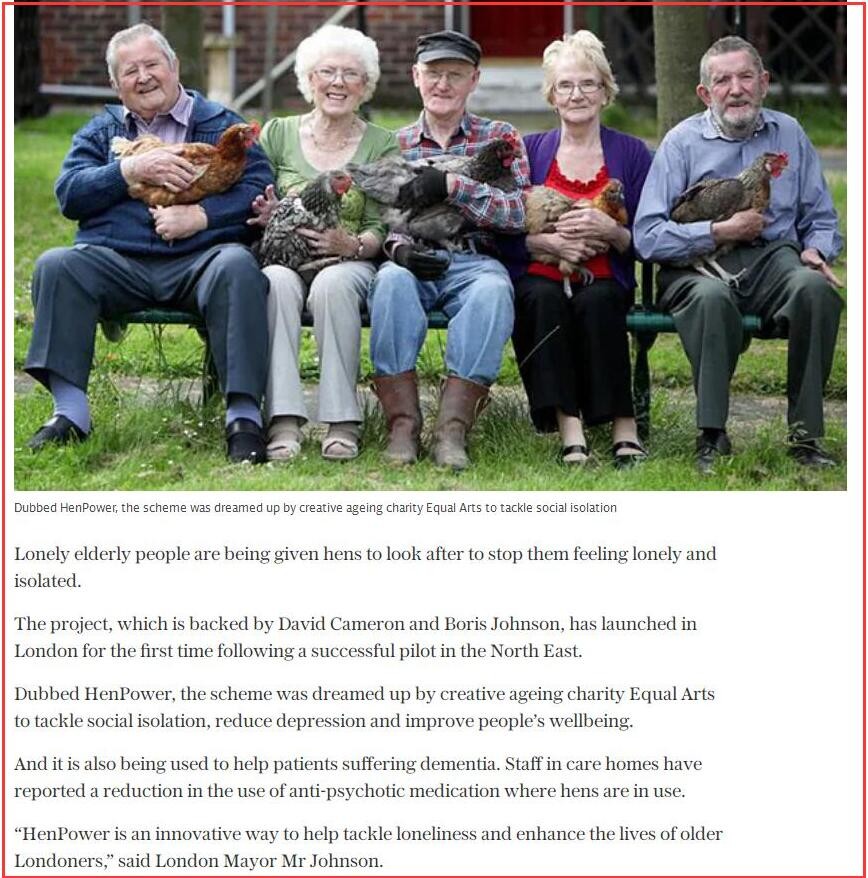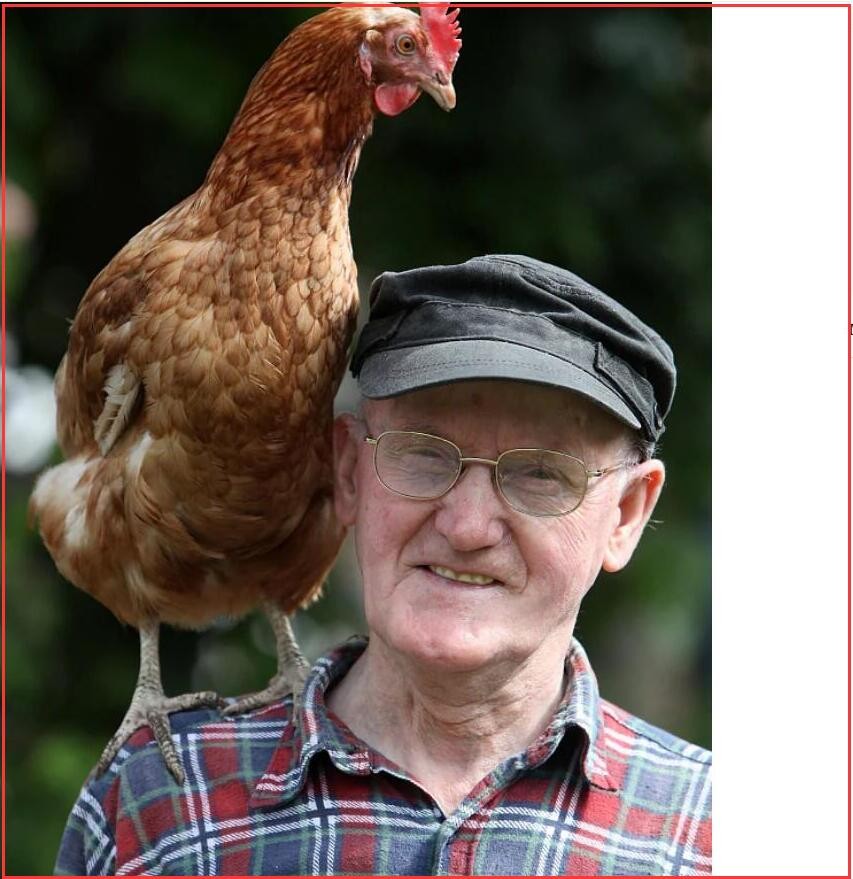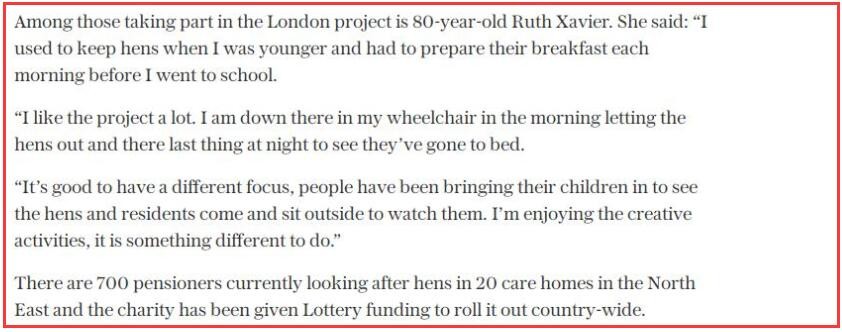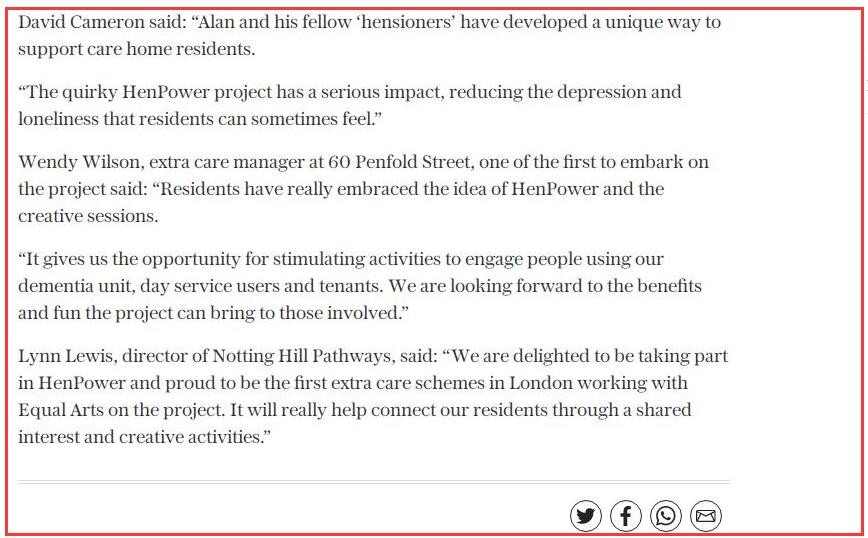2022-新全国卷Ⅰ-材料来源-阅读理解C
2022-新全国卷Ⅰ-材料来源-阅读理解C
【高考真题-再现】
The elderly residents (居民) in care homes in London are being given hens to look after to stop them feeling lonely.
The project was dreamed up by a local charity (慈善组织) to reduce loneliness and improve elderly people’s wellbeing. It is also being used to help patients suffering dementia, a serious illness of the mind. Staff in care homes have reported a reduction in the use of medicine where hens are in use.
Among those taking part in the project is 80-year-old Ruth Xavier. She said: “I used to keep hens when I was younger and had to prepare their breakfast each morning before I went to school.
“I like the project a lot. I am down there in my wheelchair in the morning letting the hens out and down there again at night to see they’ve gone to bed.
“It’s good to have a different focus. People have been bringing their children in to see the hens and residents come and sit outside to watch them. I’m enjoying the creative activities, and it feels great to have done something useful.”
There are now 700 elderly people looking after hens in 20 care homes in the North East, and the charity has been given financial support to roll it out countrywide.
Wendy Wilson, extra care manager at 60 Penfold Street, one of the first to embark on the project, said: “Residents really welcome the idea of the project and the creative sessions. We are looking forward to the benefits and fun the project can bring to people here.”
Lynn Lewis, director of Notting Hill Pathways, said: “We are happy to be taking part in the project. It will really help connect our residents through a shared interest and creative activities.”
28. What is the purpose of the project?
A. To ensure harmony in care homes.
B. To provide part-time jobs for the aged.
C. To raise money for medical research.
D. To promote the elderly people’s welfare.
29. How has the project affected Ruth Xavier?
A. She has learned new life skills.
B. She has gained a sense of achievement.
C. She has recovered her memory.
D. She has developed a strong personality.
30. What do the underlined words “embark on” mean in paragraph 7?
A. Improve.
B. Oppose.
C. Begin.
D. Evaluate.
31. What can we learn about the project from the last two paragraphs?
A. It is well received.
B. It needs to be more creative.
C. It is highly profitable.
D. It takes ages to see the results.
答案:28—31 DBCA
【高考真题-材料来源】
▲高考真题-材料来源(网址):
▲高考真题-材料来源(word文字稿):
Lonely elderly given hens to keep them company
Dubbed 'hensioners' a group of isolated elderly people in London have been given hens to look after
By Sarah Knapton
20 July 2015 • 9:41am
Dubbed 'hensioners' a group of isolated elderly people in London have been given hens to look after
Dubbed HenPower, the scheme was dreamed up by creative ageing charity Equal Arts to tackle social isolation
Lonely elderly people are being given hens to look after to stop them feeling lonely and isolated.
The project, which is backed by David Cameron and Boris Johnson, has launched in London for the first time following a successful pilot in the North East.
Dubbed HenPower, the scheme was dreamed up by creative ageing charity Equal Arts to tackle social isolation, reduce depression and improve people's wellbeing.
And it is also being used to help patients suffering dementia. Staff in care homes have reported a reduction in the use of anti-psychotic medication where hens are in use.
“HenPower is an innovative way to help tackle loneliness and enhance the lives of older Londoners,” said London Mayor Mr Johnson.
“The capital's older population is growing and it's great that Londoners will now have the opportunity to take part in this valuable scheme.”
The first schemes in the capital have been launched by Notting Hill Housing.
Owen Turnball with a hen
Owen Turnball with his hen
Among those taking part in the London project is 80-year-old Ruth Xavier. She said: “I used to keep hens when I was younger and had to prepare their breakfast each morning before I went to school.
“I like the project a lot. I am down there in my wheelchair in the morning letting the hens out and there last thing at night to see they've gone to bed.
“It's good to have a different focus, people have been bringing their children in to see the hens and residents come and sit outside to watch them. I'm enjoying the creative activities, it is something different to do.”
There are 700 pensioners currently looking after hens in 20 care homes in the North East and the charity has been given Lottery funding to roll it out country-wide.
David Cameron said: “Alan and his fellow 'hensioners' have developed a unique way to support care home residents.
“The quirky HenPower project has a serious impact, reducing the depression and loneliness that residents can sometimes feel.”
Wendy Wilson, extra care manager at 60 Penfold Street, one of the first to embark on the project said: “Residents have really embraced the idea of HenPower and the creative sessions.
“It gives us the opportunity for stimulating activities to engage people using our dementia unit, day service users and tenants. We are looking forward to the benefits and fun the project can bring to those involved.”
Lynn Lewis, director of Notting Hill Pathways, said: “We are delighted to be taking part in HenPower and proud to be the first extra care schemes in London working with Equal Arts on the project. It will really help connect our residents through a shared interest and creative activities.”
▲高考真题-材料来源(外刊截图):





- 发表于 2022-09-25 12:57
- 阅读 ( 2877 )
- 分类:高考英语






